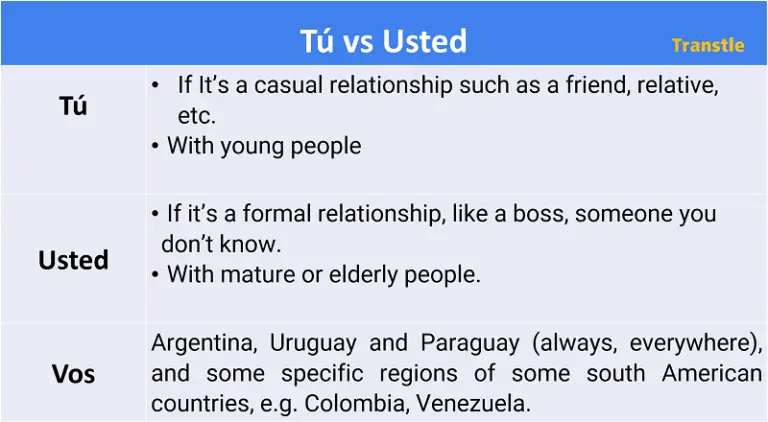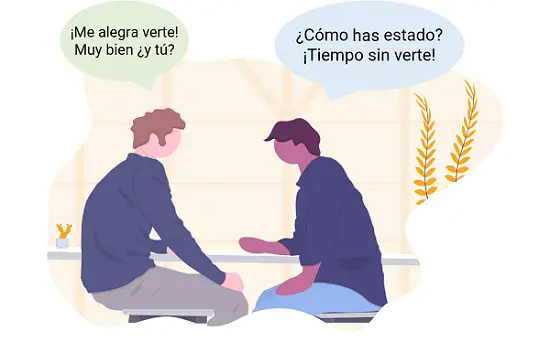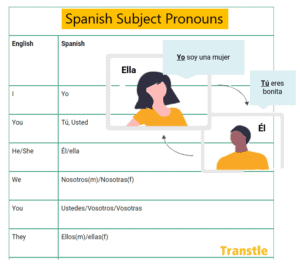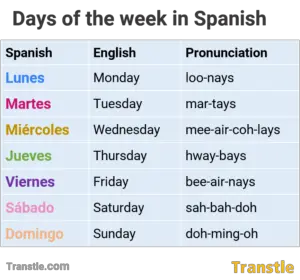Tú vs Usted: How to Use Each, Differences & Examples
Tú and usted in Spanish
Tú and usted are two ways to say “You” in Spanish, and one is more formal than the other. In Spanish you don’t address people the same way, therefore, the type of pronoun you used depends on several factors, such as the age, the type of relationship and also the country or region you’re in.
Usted is formal and denotes respect, distance, courtesy, and tú is informal or casual.
It is crucial to understand that using “tú” does not imply being inappropriate or using slang. It is a proper and acceptable way of communication. However, in specific situations, it is more appropriate to opt for “usted.” The choice between these two forms not only influences the pronouns but also affects the verb conjugations.
Contents
Differences between tu and usted
The main differences between is that tú is casual and Usted is more formal. When deciding which one to use, consider these factors:
- The relationship with the person and how well you know them.
- Age differences.
- The country or region you are in.

When to use tú
- When talking to someone you know well, like a friend, sibling, cousin, or anyone with whom you have a close relationship.
- When you’re talking to a child, teenager or young adults.
Exceptions
- In some countries, some people address their parents with “Usted” as a sign of respect. However, it’s important to note that this depends on how traditional or conservative the parents are.
- Some people may address older adults with Tú, but it is important be cautious as this could potentially seen as disrespectful.
The acceptability of using tú depends on the familiarity and relationship between individuals. If you are uncertain, it is safer to use usted.
When to use usted
Using Usted shows respect and maintains a certain level of distance and formality. You should use Usted in the following situations:
- If you are not familiar with the person or don’t know them at all, or if it’s someone like your boss, teacher, or anyone with whom you have a formal relationship.
- When talking to older adults or those who are considered more mature. This demonstrates polite manners and acknowledges their age and experience.
Examples
|
As you can see, there are not only differences in the pronoun but also in the conjugation verbs (compró, compraste), this is explained below.

Location and regional variation
Tú and Usted change depending on the country you are in, in almost all Spanish-speaking countries they have the same rules explained above, but with certain exceptions.
- In some parts of Colombia and Venezuela (a few regions, not all), they use Usted with everyone.
Voseo
In Spanish, voseo consists of the use of vos instead of tú.
- Argentina, Uruguay, and Paraguay never say Tú/Usted, they always say Vos, whichis the equivalent of tú. These three are zones with a generalized voseo.
- Vos is also common in very specific regions of Colombia and even Venezuela.
| English | Latin america, except Argentina and Uruguay. | Argentina and Uruguay |
| You, what do you want? | Tú, ¿qué quieres? / Usted, ¿Que quiere? | Vos, que querés? |
| Look at the moon | Mira la luna / Mire la luna | Mirá la luna |
Conjugation
Verbs are conjugated differently depending on the version of “you” being used.
- With tú and vos use the typical conjugation for “you” in singular: Adding an –s at the end.
Tú comes. – You eat. Vos comes.– You eat. Tú hablas. – You speak. Quieres venir? – You want to come? |
- With Usted, verbs are conjugated as done with the 3rd person singular She/He – El/ella: Without the final –s.
Usted come. – You eat. Usted habla. – You speak. Quiere venir? – You want to come? |
Check the differences
Tú estudias mucho | You study a lot |
Usted estudia mucho | |
Vos estudias mucho |
Read next



